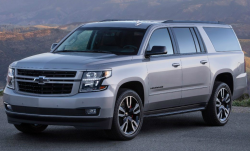
— A Chevy shake class action lawsuit will proceed, but not on a nationwide basis that would have included GM customers outside of Florida.
Florida plaintiff Douglas Weiss says his new 2015 Chevrolet Silverado 1500 suffered from the so-called Chevy shake that caused his truck to violently shake when it reached about 70 mph and shakes strongest in the range of 75-80 mph.
The lawsuit alleges the plaintiff paid more than $2,000 to replace the brakes, rotors, tires and for re-rounding of the rims. The plaintiff says he also took the truck back to a Firestorm store for realignment and rebalancing of the tires, but the violent shaking allegedly continued.
According to the class action, defective driveshafts cause the following vehicles to violently shake while driving.
- 2015 to present Cadillac Escalade
- 2014 to present Chevrolet Silverado
- 2015 to present Chevrolet Suburban
- 2015 to present Chevrolet Tahoe
- 2014 to present GMC Sierra
- 2015 to present GMC Yukon/Yukon XL
The shake is allegedly caused by aluminum driveshafts that eventually deteriorate and fail as the driveshafts drop to the ground.
The plaintiff argues General Motors sent technical service bulletins (TSBs) to dealerships for 10 years concerning the Chevy shake but allegedly refuses to make permanent free repairs to the vehicles. According to the class action, victims of the Chevy shake continue to pay for repairs even when the vehicles are allegedly still covered by warranties.
GM customers typically claim they can get rid of the Chevy shake by replacing the aluminum driveshafts with custom-made steel driveshafts. But the cost of installing a steel driveshaft is thrown onto the customer because the automaker won't recall the vehicles and won't cover repair costs.
GM customers also complain about paying for repairs that are recommended by dealerships, then learning the repairs had no effect on the Chevy shake.
GM's motion to dismiss the lawsuit attacked the plaintiff's arguments about the driveshafts and how all the named vehicles allegedly had defective driveshafts. GM told the judge that just because the plaintiff allegedly had a problem with his 2015 Chevy Silverado 1500 doesn't mean every Silverado in the country has the same problem.
In addition, the plaintiff claims multiple GM models suffer the Chevy shake, yet the plaintiff doesn't own any of those other models.
The automaker also argued the plaintiff apparently wants a limited warranty to last a lifetime because a GM dealer refused to pay for repairs after the Silverado warranty allegedly expired.
The judge ruled the lawsuit can proceed for Florida GM customers but there will be no nationwide class action lawsuit. According to the judge, the Magnuson Moss Warranty Act claim is the only federal claim asserted in the lawsuit, and the claim depends on Florida law.
The judge ruled the plaintiff doesn't claim a legal injury in any state other than Florida and doesn't allege an injury under the laws of any other state.
"Therefore, the Plaintiff lacks standing to assert claims on behalf of class members who purchased GM vehicles outside of Florida." - District Judge Robert N. Scola, Jr.
Although the claim for nationwide class action certification was dismissed, the judge did allow the Florida class action to continue based on breach of express warranties, breach of implied warranties and violation of Florida's Deceptive and Unfair Trade Practices Act.
The Chevy shake class action lawsuit was filed in the U.S. District Court for the Southern District of Florida, Miami - Weiss, et al., v. General Motors LLC.
The plaintiff is represented by Cory Watson, and Migliaccio & Rathod.
CarComplaints.com has owner-reported complaints about the vehicles named in the GM class action.




